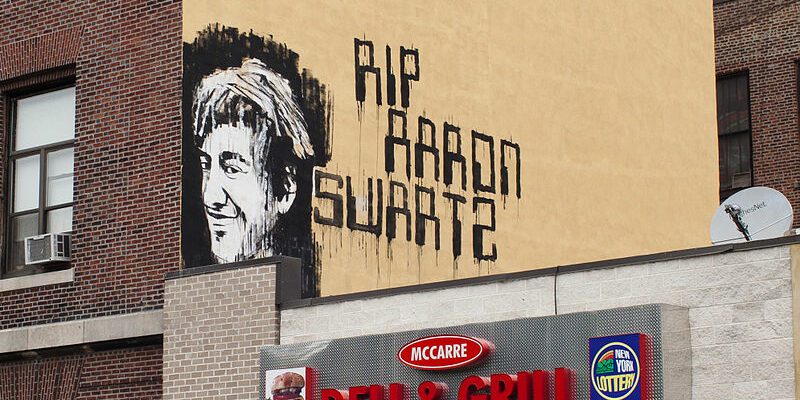“RIP Aaron Swartz”, mural by BAMN in Brooklyn (New York). Photo Almonroth/Wikimedia Commons/CC by-sa
Ten years already: on January 11, 2013, Aaron Swartz, 26, threatened with years in prison for having downloaded millions of scientific articles, committed suicide. In his too short life, he left a number of works – his participation in the RSS format, the Reddit social network and Creative Commons licenses, in particular – and fought several battles, that for open access in particular.
Themes “pioneers for the time and for its age”
The commemoration of the tenth anniversary of his death has given rise to several articles and publications. Liberation devoted a double page to him (free access, thank you Libé), on January 11, “The legacy of Aaron Swartz, the activist who overthrew the code”. Its author Amaelle Guiton quotes among others the sociologist Félix Tréguer, of La Quadrature du Net: “Swartz, it was the revolt born of the confrontation of the idealism of the beginnings of Internet with the digital dystopia which took shape under our eyes .”
Another quote in this article, Olivier Ertzscheid, teacher-researcher in information and communication sciences at the University of Nantes: “Many of the themes that Swartz posed were pioneers for the time and for his age, and appear in the Internet of 2023 as themes to be remobilized”, underlines Olivier Ertzscheid, who describes him as a figure of “political engineer” of the Net without any real equivalent today. it, too, is in its insistence on articulating code and ethics, tools and goals.”
In his blog at Framasoft, Olivier Ertzscheid notes about the importance of the memory of the young activist: “Because the story of Aaron Swartz, however sad and tragic it may be, must imperatively continue to inspire us through of the battles he led, the technologies he developed, and the infinite courage that was his to show that knowledge must be free, accessible, and that all those who oppose it or claim the contrary can only be fools or liars.”
On France Culture, a program was dedicated to him on January 13 (online there) with Flore Vasseur, writer, journalist and entrepreneur, and Brice Augras, ethical hacker. For Flore Vasseur, “Aaron was a fiery spirit who found a certain form of pacification by sitting at his work table to code, and at the same time his body resisted and was sick all the time. There was this permanent pain in Aaron to come up with the right idea, with a requirement that was probably the engine, the fuel of this disease. He was never satisfied.”
A documentary on “the child of the Internet”
At the age of 12, recalls Numerama, “the young man won a prize in computer science for having created a kind of proto-Wikipedia. It was called “The Info Network” and it was a collaborative encyclopedia. We are then in 1999. The Wikipedia that we know is only launched two years later. After his disappearance, projects initiated by or with Aaron Swartz continued on their way, explains Liberation, including a system for transmitting confidential documents, the SecureDrop software, supported by the Freedom of the Press Foundation and used by several major media.
In 2014, a movie, “The Internet’s Own Boy: the Story of Aaron Swartz,” was directed by Brian Knappenberger. You can see or download this documentary, under CC by-nc-sa license, in different formats, including on archive.org and various platforms.
Last but not least, April dedicated its weekly program on Libre à vous to this tenth anniversary (but I haven’t listened to it yet) – with, among other speakers, Flore Vasseur and Amaelle Guiton.
Read also
A documentary about Aaron Swartz, computer scientist and activist – June 29, 2014
Suicide of Aaron Swartz, computer scientist and free Internet activist – January 13, 2013
